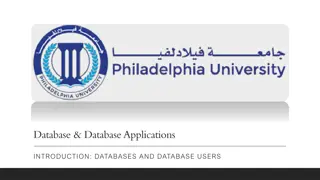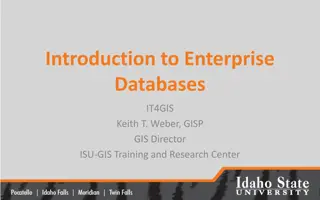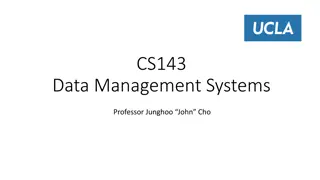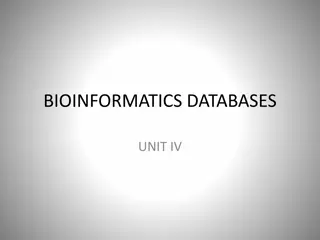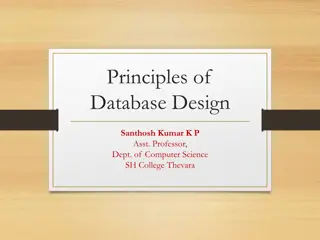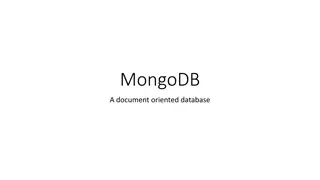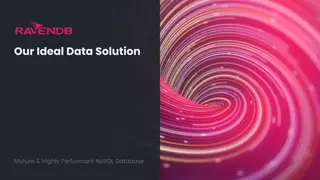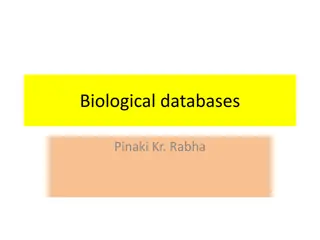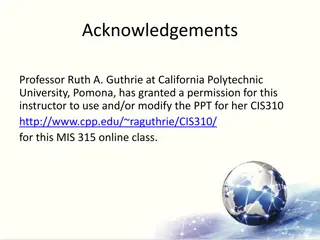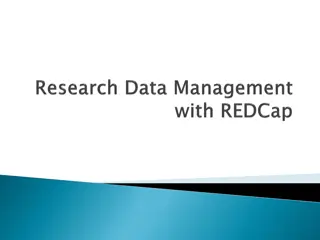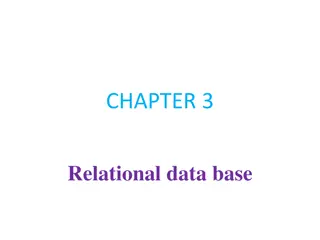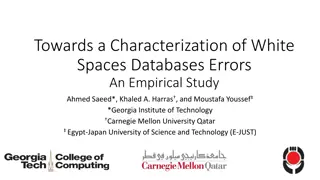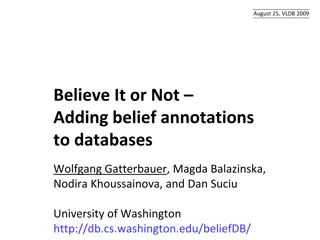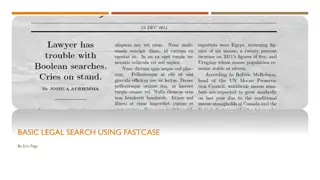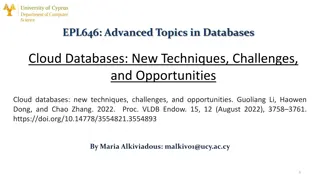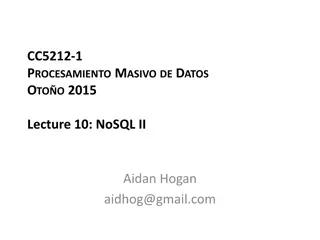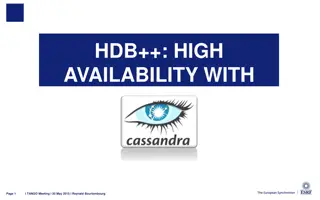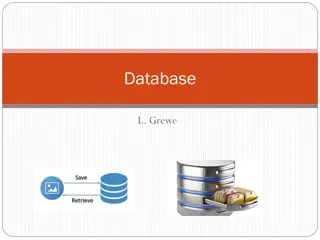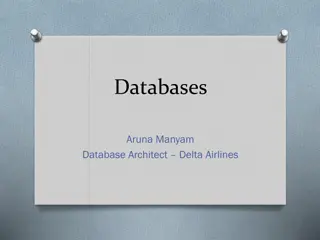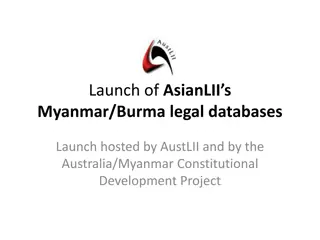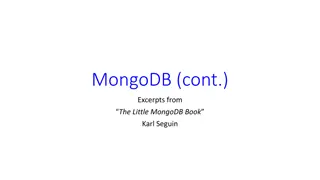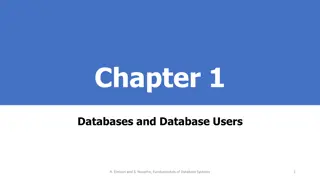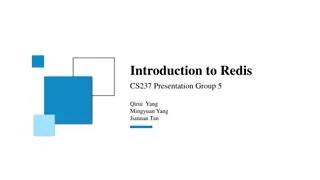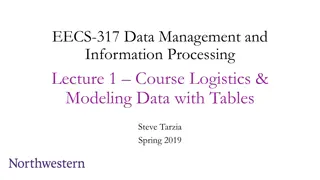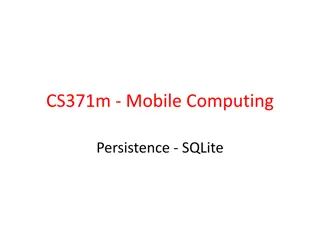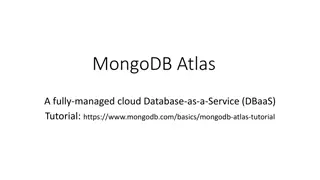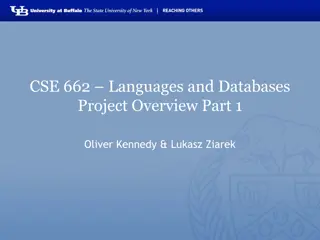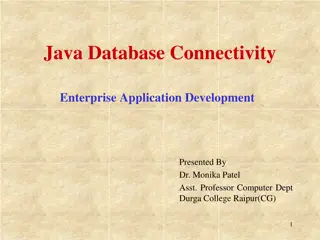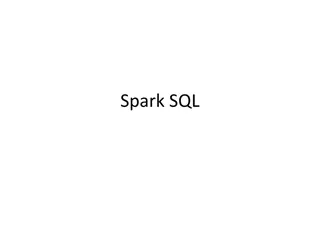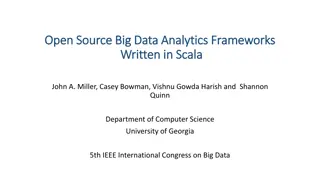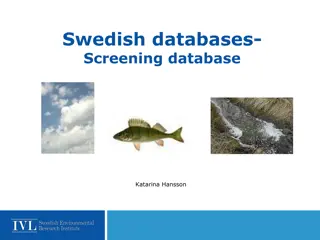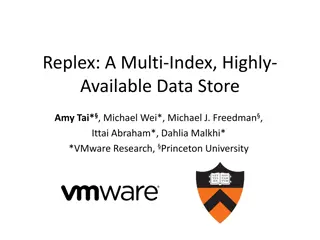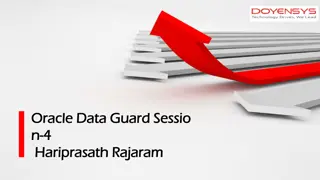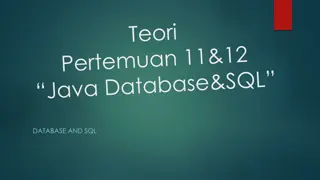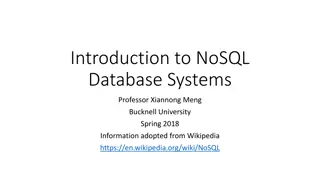Databases and Database Applications
Databases are collections of related data used to store known facts with implicit meanings in a structured manner. A Database Management System (DBMS) is crucial in managing databases efficiently by defining structures, loading data, manipulating content, ensuring security, and facilitating data acc
1 views • 15 slides
Introduction to Enterprise Databases for GIS Professionals
Explore the world of enterprise databases through a GIS perspective with a focus on concurrent clients, database administration, creating databases/tables, checking service names, unique features, numeric data types, data type parameters in ArcGIS, and character data types. Gain insights into managi
1 views • 52 slides
Introduction to CS143 Data Management Systems Course
This course, taught by Professor Junghoo John Cho, covers topics such as data management systems, SQL, RDBMS, and NoSQL databases. Students will learn to store data, interact with databases using SQL, and understand the workings of DBMS. The course objectives, structure, staff information, lecture f
1 views • 21 slides
Exploring the World of Bioinformatics Databases
Bioinformatics databases are essential tools in handling molecular biological data, classified into sequence and structure databases. Primary databases store raw data, while secondary databases contain curated information for research. Examples include GenBank, Protein Data Bank, and SWISS-Prot.
1 views • 38 slides
Database Design Principles and Management Overview
This document presents an overview of database design principles, including structured, semi-structured, and unstructured data types. It delves into the role of Database Management Systems (DBMS) in defining, constructing, manipulating, and sharing databases effectively. It also covers various types
0 views • 47 slides
MongoDB vs. Relational Databases: Myth vs. Reality in NoSQL Design
MongoDB is a document-oriented database that challenges traditional relational databases by offering flexible schema designs. While myths suggest no need for schema design or relationships in MongoDB, the reality emphasizes the importance of thoughtful schema design and choice in data relationships.
2 views • 21 slides
RavenDB: A High-Performance NoSQL Database Solution
RavenDB is a mature and highly performant NoSQL database designed to meet the evolving needs of cloud applications, IoT devices, and distributed environments. Offering features like fully ACID transactions, scalability, and exceptional performance, RavenDB has become a popular choice for organizatio
1 views • 20 slides
An Overview of Biological Databases in Bioinformatics
Biological databases play a crucial role in bioinformatics, storing vast amounts of data related to nucleotide sequences, protein sequences, and more. These databases are publicly accessible and essential for research in biological fields. Primary databases, such as GenBank, EMBL, and DDBJ, contain
1 views • 13 slides
Data Management and Databases
Explore the concepts of data, information, and knowledge, learn why databases are superior to spreadsheets for data storage, and delve into the organization and functionality of relational databases for decision-making purposes.
1 views • 18 slides
The Importance of Databases for Research Data Management
Databases play a crucial role in research data management by allowing systematic organization, easy data entry, manipulation, and analysis. They enable storing and accessing data efficiently, ensuring data integrity and security, and facilitating complex queries and associations that are not possibl
3 views • 58 slides
Relational Databases and File-Based Systems
This chapter delves into the fundamental concepts of databases, comparing them to file-based systems, and highlighting the significance of relational databases in modern integrated AISs. It explores the difference between logical and physical views of databases, introduces key concepts such as DBMS
1 views • 70 slides
White Spaces Databases: An Empirical Study
White spaces in the TV band offer opportunities for unlicensed usage, motivating research on white space detection methods like geolocation spectrum databases and spectrum sensing. This study explores errors in white spaces databases, discussing the challenges and implications for white space device
4 views • 30 slides
Managing Belief Annotations in Databases: A Modal Logic Approach
Explore the concept of belief databases that enable data curation based on modal and default logic in a relational model. The work discusses managing inconsistent views in community databases and presents a motivating application scenario to illustrate the challenges and solutions in handling belief
0 views • 34 slides
Databases and Search Methods in Legal Research
Dive into the basics of legal search using Fastcase, exploring the concept of databases, integrated vs. non-integrated content, indexed and full-text databases, along with examples and the benefits of natural language searching in legal research. Gain insights on the types of databases, how informat
0 views • 20 slides
Agile Project Development with Ruby on Rails at The Forge
The Forge is a website created by Bryan Denslow to facilitate agile project development using Ruby on Rails. Projects are managed with Epics, each containing tasks to be completed. Users can collaborate, add or remove team members, and provide comments on tasks. The platform utilizes Ruby on Rails f
0 views • 22 slides
Stored and Inherited Relations in Relational Databases
Explore the concept of Stored and Inherited Relations (SIR) in relational databases, as discussed by Witold Litwin at Dauphine University. Discover how a typical scheme of a stored relation defines a natural SIR, leading to more efficient query formulations and less procedural querying processes. Le
1 views • 27 slides
Data Beyond the Relational Model
Serge Abiteboul delves into the world beyond the relational model, challenging established norms in industry and academia, aiming to facilitate application development and enhance performance. The lecture covers topics such as organization trees, XML graphs, object databases, NoSQL, OLAP, and more,
0 views • 52 slides
Emerging Trends in Cloud Databases: Challenges and Opportunities
Cloud databases have revolutionized data management, offering scalability and efficiency. This article explores new techniques in cloud-native databases, challenges faced in cloud DBs, and the architecture of Cloud OLTP and OLAP systems. It delves into the significance of OLTP and OLAP in different
1 views • 25 slides
Advanced Databases and Online Analytical Processing
Explore the world of data warehousing, advanced databases, OLTP, and OLAP with Dr. Nicholas Gibbins. Learn about traditional processing styles, multidimensional databases, and the dynamic analysis techniques of Online Analytical Processing (OLAP). Understand the importance of asking "what if" questi
2 views • 33 slides
NoSQL Systems and Database Models in Data Processing
Delve into the realm of NoSQL databases and their differences with relational databases. Discover the landscape of database models, including key-value and document stores, along with insights on Amazon DynamoDB's object versioning system.
0 views • 67 slides
Cassandra - A High Availability Database Solution
Cassandra, a massively scalable open-source NoSQL database, offers high availability and resilience with its peer-to-peer architecture, replication, and continuous availability across multiple data centers. Its query language, CQL, provides SQL-like functionality with some limitations. Explore the f
0 views • 67 slides
Database Management Systems and Data Storage
Explore the world of Database Management Systems (DBMS) and learn about the evolution of data storage from flat-file to relational databases. Discover the key features of a DBMS, different database types, administration tools, SQL and NoSQL databases, CAP theory, and considerations for choosing betw
1 views • 32 slides
Databases and Information Technology in Delta Airlines
Explore the critical role of databases and information technology in Delta Airlines, the second largest airline in revenue globally. From data storage to operational efficiency, learn how IT powers various functions such as flight operations, customer service, revenue management, and more, ensuring
0 views • 25 slides
Launch of AsianLIIs Myanmar/Burma Legal Databases by AustLII
The launch of the AsianLIIs Myanmar/Burma legal databases hosted by AustLII and the Australia/Myanmar Constitutional Development Project aims to provide a valuable tool for researchers, improve access to legal information in Myanmar, and support priority projects. The databases offer resources for s
2 views • 4 slides
MongoDB: Array Operations, Data Modeling, and NoSQL Concepts
Delve into MongoDB array operations such as accessing array elements with $slice, data modeling concepts, and the absence of joins in NoSQL systems. Learn how MongoDB handles relationships, querying nested data, and the nuances of data modeling in comparison to relational databases.
0 views • 43 slides
Overview of Databases and Recent Developments in Database Systems
Explore the fundamentals of databases, including types, applications, users, and advantages. Learn about traditional and recent database applications, such as social networks, search engines, and emerging technologies like Big Data systems and NOSQL. Understand the concept of databases as a collecti
2 views • 30 slides
Redis: A Key-Value NoSQL Database Overview
Redis is a flexible in-memory data structure store that acts as a database, cache, and message broker. It follows a key-value store principle, offering various data structures like strings, lists, sets, and more. Redis allows users to store a large amount of data without the limitations of relationa
0 views • 15 slides
Handling Complex Data with SQL Databases: A Powerful Foundation for Data Science
Learn how to manage real-world, complex data efficiently using SQL relational databases. Explore the limitations of Excel and Matlab in modeling data relationships and data integrity enforcement. Understand the importance of keeping data and analysis separate. Delve into examples of data sets beyond
1 views • 34 slides
Introduction to Relational Databases and SQLite for Mobile Computing
Covering the basics of relational databases, SQL, and SQLite, this content provides an overview of database management systems, their history, and the key concepts related to data storage and retrieval. It also touches on the practical aspects of working with SQLite in Android applications, outlinin
2 views • 61 slides
NoSQL: Evolution and Key Concepts
Exploring the world of NoSQL databases, this comprehensive overview delves into the history, key features, and evolution of NoSQL technology. From the motivations behind its development to the various systems and papers that shaped its landscape, this content provides insights into how NoSQL has rev
0 views • 19 slides
MongoDB Atlas Overview and Tutorial
MongoDB Atlas is a fully-managed cloud Database-as-a-Service offering by MongoDB. This tutorial provides a step-by-step guide on how to set up a free MongoDB Atlas account, create databases and collections, add database users, and explore and manipulate your data using MongoDB Compass. The tutorial
3 views • 34 slides
Database Benchmarking: Embedded Databases Comparison
This project involves benchmarking lightweight embedded databases like SQLite, BerkeleyDB, and others. Students will evaluate and compare these databases using specific workloads to analyze their performance. The outcomes include a detailed report on each system's strengths and weaknesses. Required
0 views • 19 slides
Introduction to Java Database Connectivity (JDBC) in Enterprise Application Development
JDBC, or Java Database Connectivity, is a vital technology in enterprise application development that provides a standardized library for Java programs to connect to databases via SQL commands. It abstracts vendor-specific details, making connectivity to multiple databases seamless. JDBC API standar
1 views • 13 slides
Evolution of Database Systems: A Spark SQL Perspective
Explore the evolution of database systems, specifically focusing on Spark SQL, NoSQL, and column stores for OLAP. Learn about the history of parallel DB systems, common complaints, the story of NoSQL, and the advantages of column stores for data aggregation and compression in OLAP scenarios.
0 views • 25 slides
Evolution of Scala-Based Open Source Big Data Analytics Frameworks
The evolution of big data analytics frameworks written in Scala, such as Spark, Kafka, and Samza, has led to significant improvements in parallel execution and support for NoSQL databases. Scala's functional and object-oriented programming capabilities have enabled the development of powerful analyt
0 views • 16 slides
Environmental Monitoring and Screening Databases in Sweden
This content delves into the monitoring and screening databases managed by Katarina Hansson at IVL, focusing on chemicals, emissions, and national environmental data in Sweden. It covers the use of national databases, biota databases for pollutants in biological samples, and screening studies involv
1 views • 10 slides
NoSQL Database Scalability Using Indexing Techniques
Dive into the world of NoSQL database scalability by understanding how indexing enables richer queries and how local indexing impacts partitioning, updates, and lookups across distributed databases.
0 views • 59 slides
Oracle Data Guard: Training Objectives and Far Sync Instances
This content highlights training objectives for Oracle Data Guard, focusing on the new features such as Far Sync Instances and Active Standby Databases. It covers configuring Data Guard Broker, plugging Pluggable Databases, recovering Standby Databases, and achieving a highly available Oracle Databa
0 views • 25 slides
Databases and SQL: A Comprehensive Overview
Databases are fundamental in computer-based record-keeping systems, essential for organizations to maintain and access crucial information efficiently. This comprehensive guide covers the significance of databases, advantages of centralized databases, database models, relational databases, and more.
0 views • 52 slides
NoSQL Databases in Modern Data Management
NoSQL databases offer innovative storage and retrieval mechanisms for diverse data types, deviating from traditional relational databases. This article explores the history, definition, advantages, challenges, and types of NoSQL databases, shedding light on their pivotal role in current data managem
0 views • 11 slides
